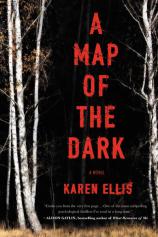A Map of the Dark
Review
A Map of the Dark
For FBI Agent Elsa Myers, investigating the disappearance of children is her vocation and her passion. However, the timing of her work on the case of Ruby Haverstock couldn’t be worse. Her usual professional demeanor and methodology begins to crumble as she is also dealing with the imminent death of her father and all the family trauma that his last days bring to the surface.
Karen Ellis’ A MAP OF THE DARK could’ve been a straightforward thriller or police procedural, but is instead a complex exploration of abuse and pain, and the way it strangles and destroys in both expected and unexpected ways. Elsa’s investigation is interesting, but her responses to it, coupled with what readers learn about her, is compelling.
"A MAP OF THE DARK could’ve been a straightforward thriller or police procedural, but is instead a complex exploration of abuse and pain, and the way it strangles and destroys in both expected and unexpected ways."
While Elsa’s instincts about Ruby often prove spot-on as she works to find her alive, her attention is not as fully on the case as it needs to be as she divides her time and emotional energy between work and her father’s hospital bedside. Time is of the essence in finding Ruby, yet Elsa comes across obstacle after obstacle in the case.
Apart from her father’s rapidly failing health and sharing responsibility for her niece, Mel, Elsa is no longer able to suppress memories about her mother, Deb, and the horrible treatment she inflicted on her until the day she was killed in the family’s kitchen. But when a second girl goes missing, and then a third (who happens to be Mel), everything begins to click into place. Elsa and her new partner, Lex Cole, zero in on a suspect and follow a trail of evidence, hoping it will lead them to all three girls.
The requisite new partner dilemma is nicely treated by Ellis, and Lex proves to be a bit of an enigma, which makes for a good read. The real story here, but one that Ellis only gradually unfolds, is between Elsa and her parents. Everything else here needs to be viewed through the prism of the catastrophic events of her childhood, but Ellis withholds so much until the very end, ensuring that Elsa remains a difficult yet not unlikable character through most of the book.
For a psychological thriller, Ellis needed to give her readers a deeper and more insightful exploration of Elsa, the criminal, or ideally both. There are twists here, even a bit of romance, but several key questions are left unanswered, especially in regards to the motivation of a few characters. The pace is on the slow side, lacking urgency, and Ellis doesn’t give much time to the details of the investigation.
Still, Elsa Myers is a complicated and even surprising character. Readers will want to stick with her, both as she works to save the lives of the missing girls and catch the perpetrator, and as she faces her emotions and wrestles with her own past deeds.
Reviewed by Sarah Rachel Egelman on January 19, 2018




